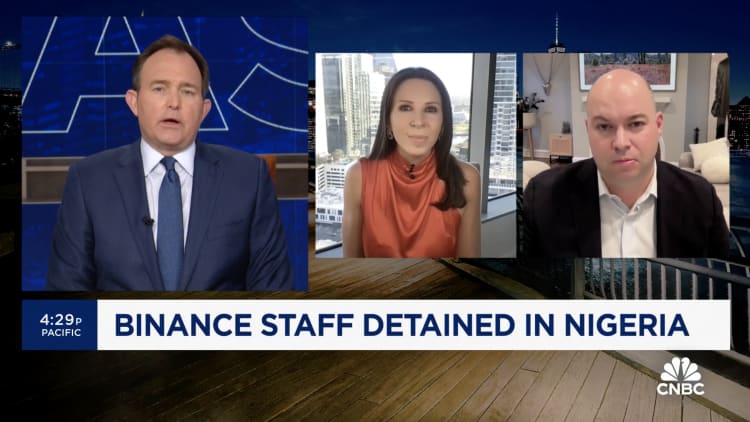Binance executive escapes Nigerian custody as authorities file new tax charges
The logo of cryptocurrency exchange Binance displayed on a smartphone with the word “cancelled” on a computer screen in the background.
Budrul Chukrut | SOPA Images | LightRocket via Getty Images
One of two Binance executives detained in Nigeria has escaped custody, while the Nigerian government has filed new tax evasion charges against the global cryptocurrency exchange.
Nigeria’s Federal Inland Revenue Service (FIRS) Monday announced that four new charges relating to tax evasion had been filed at the Federal High Court in Abuja, according to multiple local media reports.
Binance faces charges of alleged non-payment of Value-Added Tax (VAT) and company income tax, failure to submit tax returns and complicity in aiding customers to evade taxes through its platform, the reports said.
Alongside the company, two senior executives â U.S. citizen Tigran Gambaryan and British-Kenyan Nadeem Anjarwalla â were both charged and remanded in custody by Nigerian authorities.
Reports emerged over the weekend that Anjarwalla escaped on Friday from the Abuja guest house where the pair was detained.
“We were made aware that Nadeem is no longer in Nigerian custody. Our primary focus remains on the safety of our employees and we are working collaboratively with Nigerian authorities to quickly resolve this issue,” a Binance spokesperson told CNBC.
The country is in talks with Interpol to secure an international arrest warrant for Anjarwalla, Reuters reported, citing Nigeria’s national security adviser. The National Security Agency did not immediately respond to a CNBC request for comment.

The families of the two employees declined to comment at this time, but issued statements on March 20, following a hearing at which Nigerian authorities extended their detainment.
Anjarwalla’s wife, Elahe Anjarwalla, said she was “completely heartbroken” that he would not be home in time to celebrate their son’s first birthday.
“Nadeem has no authority to make high level decisions at Binance and I am once again asking from the bottom of my heart that the Nigerian authorities please allow him and Tigran to return home whilst they continue their discussions with Binance. I am also calling on the British and Kenyan governments to do more to get Nadeem back home to us,” she said.
Gambaryan’s wife Yuki said she did not know what to tell their two children about their father’s absence.
“Tigran is globally recognized for his work in law enforcement and many of his peers would say that Tigran’s continuous efforts are what keep crypto currencies safe and clean,” she said.
“Please let him come home to continue this good work. The longer that our husbands are away from our families, the harder it is becoming for us to go about our daily lives.”
A month in custody
Gambaryan and Anjarwalla were taken into custody in Nigeria on Feb. 26, although neither was charged at the time with any crimes. The Abuja government accused their employer of wreaking havoc on the country’s local currency.
The Nigerian naira is one of the worst-performing currencies in the world and has lost nearly 70%Â of its value to the U.S. dollar over the past year. Locals have flocked to cryptocurrencies in recent years to shelter their savings from the plunging currency and a soaring inflation rate that hit nearly 30% two months ago.
But Binance’s troubles in Nigeria appear to be less about a crypto crackdown and more of an attack on what Abuja sees as a bad actor in the space.
IBADAN, Nigeria – Feb. 19, 2024: Demonstrators are seen at a protest against the hike in price and hard living conditions in Ibadan on February 19, 2024.
Samuel Alabi | Afp | Getty Images
Nigeria has expressed two chief concerns with Binance â the fact that the government doesn’t know where money goes or how it moves through the exchange, and that the exchange was allegedly facilitating speculation on the price of the naira through its peer-to-peer marketplace.
The government alleged that Binance was laundering money and that $26 billion worth of untraceable funds had moved through the exchange.
Authorities in Abuja have also contended that traders using this P2P platform to trade the local currency for U.S. dollar-pegged stablecoins, like tether, were colluding on the price to maximize the exchange value. Binance has since shut down its peer-to-peer trading platform in Nigeria.
This is not the first time that Abuja has taken issue with Binance. In July 2023, Nigeria’s Securities and Exchange Commission put out a circular warning people against doing business with the exchange, noting that “any investing public dealing with this entity” was doing so at a “high level of risk” that “may result in total loss of investments.”
â CNBC’s Ruxandra Iordache contributed to this report.















































